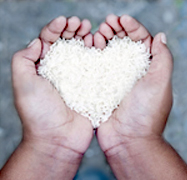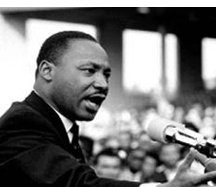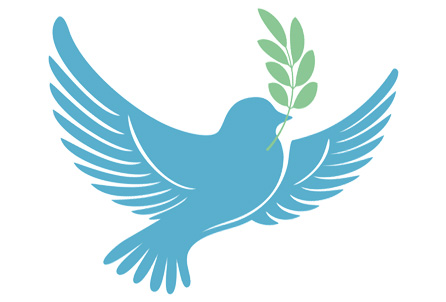|
|
Friends of Adin Ballou
Peace Essay Contest
2014 Essay Contest Winners
|
|
First Prize:
My Perspective on Peace
by Yu Jin Kim
|
 “Lunch time is only forty minutes!” shouted the principal of my Korean Language School.
I sprinted as fast as my eight-year-old legs could carry me to my mother, who had prepared exquisite Japanese
homemade rice balls. As I took my first scrumptious bite of nirvana, even before devouring the whole crispy-pink
salmon rice ball covered in flaky-glazed dried seaweed, a little Korean boy glared at me with a penetrating stare.
In seconds, my mother grabbed a rice ball for the boy. As he reached out his petite hands with great bliss to receive
the delicacy, he was instantly stopped by a spank from his older brother, who whispered, “Her mom is Japanese.”
The boy dolefully refused the rice ball. Pure bewilderment swept into my innocent eyes.
“Lunch time is only forty minutes!” shouted the principal of my Korean Language School.
I sprinted as fast as my eight-year-old legs could carry me to my mother, who had prepared exquisite Japanese
homemade rice balls. As I took my first scrumptious bite of nirvana, even before devouring the whole crispy-pink
salmon rice ball covered in flaky-glazed dried seaweed, a little Korean boy glared at me with a penetrating stare.
In seconds, my mother grabbed a rice ball for the boy. As he reached out his petite hands with great bliss to receive
the delicacy, he was instantly stopped by a spank from his older brother, who whispered, “Her mom is Japanese.”
The boy dolefully refused the rice ball. Pure bewilderment swept into my innocent eyes.
At eight years old, my first encounter with racial and cultural discrimination inspired me to question my identity.
Japan and Korea share a brutal history of conflict since Japan’s 1910 annexation of the Korean peninsula.
The story of Japan’s colonial dominion of Korea is embedded with emotional scars, physical wounds and enmity.
However, in my eyes, Korea and Japan are not enemy nations; they are the nations where my precious father and mother
were raised and where my roots lie. As an American, Korean, Japanese and global citizen, my understanding of peace
is resolving cultural clashes through understanding, forgiveness and true love.
I will give meaning to the life I’ll lead, because growing up amidst cultural differences and challenges
has shaped my perspective on life.
|
|
Second Prize:
What Peace Means to Me
by Lindsay Bailey
|
 Peace is often described as the absence of war or argument, a time of serenity and tranquility.
However, peace is much more than this simplistic notion; it is the fostering of ideals that promote good citizenry.
Peace is not only acceptance, respect, and tolerance of others, but a genuine love for one’s fellow man.
Peace is not simply an unrealistic or unattainable ideal; rather, it is an ethical practice worthy of study and a
powerful agent of change.
Peace is often described as the absence of war or argument, a time of serenity and tranquility.
However, peace is much more than this simplistic notion; it is the fostering of ideals that promote good citizenry.
Peace is not only acceptance, respect, and tolerance of others, but a genuine love for one’s fellow man.
Peace is not simply an unrealistic or unattainable ideal; rather, it is an ethical practice worthy of study and a
powerful agent of change.
Some of our world’s greatest leaders were those who used peace to cause societal transformation.
Martin Luther King Jr. attacked racial segregation through his powerful sermons. In his Nobel Prize acceptance speech,
he said, “Nonviolence … is a weapon which cuts without wounding and ennobles the man who wields it.”
He shows that peace acts not only as an ethical ideal, but as a catalyst, a means to channel change and new ideas
without the devastation caused by violence, empowering the person who uses it.
To me, peace is not a final end product to a conflict; it is an influential tool that can provoke change,
while still abiding by one’s moral and ethical standards. When used as a means to resolve conflict,
peace allows us to focus on what unites us even when our fellow man is seemingly irrational or objectionable.
Perhaps it is best to find common values, such as love of one’s family or country, and use these feelings
to encourage change in the form of peace, rather than succumb to violent methods.
|
|
Third Prize:
What Peace Means to Me
by Madison Polay
|
|
Listen to a serene forest in the early morning: the song of the birds, the flow of a river, the tranquility
in the environment; this is Peace. Feeling love for one another, listening to people’s points of view,
giving aid to one another; this is Peace.
To me, Peace is a state of serenity, a state free of war, violence and disturbance. Peace is not perfect;
it is flawed but it is an acceptance. Peace is the ability to feel safe and to have freedom. Peace is the acceptance
to disagree, but to come to a compromise. In this world, countries have been fighting throughout history over ethnicity,
religion, and land all because of the infatuation of power. Jimi Hendrix once said, “When the power of love overcomes
the love of power, the world will know peace.”
Brave, passive activists such as Martin Luther King Jr. and Mahatma Gandhi fought for Peace.
These leaders fought for different reasons, but for the sole purpose to achieve Peace through non-violence.
They did this through love and compassion for one another and through speaking up for acceptance,
freedom and equality for all people. Adversities are inevitable, yet they can be overcome. They can be overcome
by working together, standing up against violence through passive resistance and starting a chain reaction.
Peace is universal. It only takes one helping hand, one small act of kindness to ignite a flame, to spread Peace,
to change the world.

|
|
Honorable Mention:
Peace: Understanding
by Maddie Davidshofer
Life is a heterogeneous collection of joyous memories, tragic hardships, and rewarding experiences.
Life is beautiful, unfair, limitless, frustrating, and mysterious; Life is real. Every individual possesses the audacity
to foster the uniqueness we call life. This audacity springs from within. Life is a journey of one thousand steps.
The first step begins with an individual decision. I believe that the meaning of peace is synonymous with
the meaning of life, a complex yet remarkably simple concept. When asked to elaborate on the meaning of peace,
most would offer “non-violence” or “an uncontroversial state of being.” However, peace extends far beyond this realm of
tangible comprehension. The meaning of peace is more than meets the eye.
Peace has long been debated by philosophers and politicians alike. Albert Einstein once stated,
“Peace cannot be kept by force; it can only be achieved by understanding.” Peace does not contain a mathematical formula
nor does it entail clear-cut rules; peace is abstractly individualized. Being at peace is truly discovering oneself,
respecting others, and most importantly, understanding life. Understanding is the portal to achieving peace from within.
Even the famous scientist, Albert Einstein, reminds us that peace must be chosen and not forced upon.
Although many would argue that peace is a community or national effort, I believe peace ignites from the soul of the
individual. After all, if we as individuals are at peace, the world transforms into a radiant array of unique life journeys.
|
|
Honorable Mention:
Peace Means Unity
by Jack Gallagher
Peace is an innate language. Through peace, we are able to communicate with one another. Peace is the same
throughout any culture, religion, or view, despite all of our differences. This one language helps unite us in
one common goal, to achieve world peace. Once you are aware of peace, and figure out how to spread it, you will instantly
find a connection to the hundreds of thousands of people trying to spread peace worldwide.
Gandhi and Dr. King were able to unite hundreds of thousands of people. Spreading peace in your home, community, or school
you will create a sense of unity. The spreading of peace will also strengthen your relationships with the people you
love as well.
Although peace can mean tranquility or calmness, unity is the most powerful definition. Peace can unify many people
of different backgrounds or even the same background. Dr. King unified black Americans, by acting as a focal point to
unite behind. He also facilitated communicate between geographically disparate groups. They all had something to
talk about, the chance of being free and equal and the chance to have peace in the world.
Like Dr. Martin Luther, try to spread peace to people and unify them. It will be amazing how many new people
you will meet and how many relationships you will strengthen. Remember, peace is an innate language that brings unity
to the multitudes of people worldwide who share a common goal of goodness.
|
|
Honorable Mention:
Peace Is Our Inner Voice
by Roma Gujarathi
“Peace comes from within, Do not seek it without.” ~ Buddha
Once upon a time, I closed my eyes and envisioned a beautiful land of eternal solace, perpetual sunshine and unceasing harmony. It was, to me, the utter embodiment of peace. I opened my eyes and from that point forward, I embarked on a quest; I needed to find this place of my dreams. I searched for my utopia in other individuals as well as particular places. The effort, was, however, futile; nowhere could I find the paradise that I so desperately sought. I closed my eyes again, and the alluring wonderland once more emerged. It was then that I ultimately realized the true nature of peace.
Peace was not some extrinsic force that I could find from a certain individual nor was it a particular region. Rather, peace was an internal force, a flame that burned within me. Why did I seek to find peace elsewhere when all I had to do was hear my inner self?
This very flame burns within you, too. In fact, it is the cornerstone upon which we all live. Peace is the simple smile I share with my neighbor every day. Peace is the listening ear you lend to your loved ones. Peace is the cry within us, demanding that we selflessly serve our fellow mankind.
When I shut my eyes and truly listened to my inner voice, I attained my heaven, my peace. Now, close your eyes to find yours.
|
|
|

